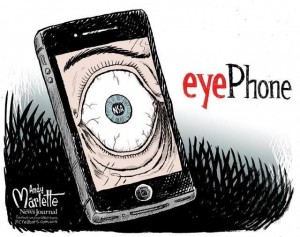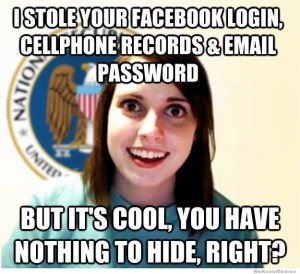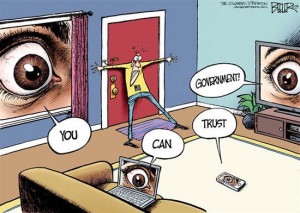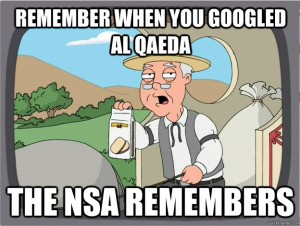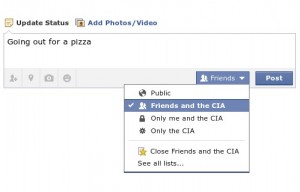In a society with ever-increasing amounts of surveillance, it is not a big leap to argue that there will be a range of opinions regarding surveillance. The reasoning behind surveillance is something that is often questioned. Modus operandi, or methodology, is something that is also brought into the spotlight. Arguments could be made for why ever-increasing levels of surveillance are necessary. There are just as many arguments for why it is not. Regardless of the arguments surrounding the levels of surveillance seen in society, the surveillance is there. As a result, there are groups and individuals who have taken it upon themselves to resist the surveillance state in which we now live. The methods and effectiveness of these resistances are open to interpretation, yet the fact still remains: Resisting is necessary, however effective or ineffective it may be.
In his article, “A Tack in the Shoe: Neutralizing and Resisting the New Surveillance” Gary Marx, an Emeritus professor at MIT, stated that there are a primary set of eleven concepts to aid in the avoidance of surveillance. These include masking behaviors, Distorting, avoidance, piggy backing, and simple refusal behaviors. Professor Marx outlines types of behaviors that allow one to resist the surveillance on a general level, with what he describes as “resistance or non-compliance.” He goes into how each type of behavior may be implemented to aid in the everyday resistance of surveillance. For Example, he describes how piggy backing actions can hide when one might enter or exit a building. Assuming you have legitimate purposes and clearance to enter an area, instead of swiping your card upon entering to open a door, merely walk in as someone else swipes. The technique of discovering what surveillance may be active is a form of surveillance all its own. Marx outlines another example of a radar detector in a vehicle. It can detect if a police officer is using radar. The counters surveillance, or “discovery surveillance” works as long as it is assumed there is actual surveillance in place.
There are ways to resist the surveillance we now face. One example is the Detekt softwares. It is designed to be used on windows PCs in order to detect spyware used on a commercial scale to monitor a staggering number of individuals. It is recommended that if you suspect that your computer is tagged to disconnect it from the Internet and all networks. This is in the hopes to limit further observation. There are a large number of tools to fight against malware and spyware. These tools have become necessities for maintaining one’s privacy.
In a recent article in Al Jazeera America, “Resisting the Surveillance State of Mind,” authored by Norman Solomon, Solomon quoted a German named Wolfgang Schmidt. Schmidt was a Lieutenant Colonel in the german Stasi, the former East German Special Police. Schmidt compared the surveillance he oversaw in the 1980’s. He states it was tiny in comparison to the NSA’s programs. He also stated that for an operative, this level of surveillance would have been “a dream come true”. This is coming from someone who worked in what is historically viewed as one of the most repressive intelligence groups ever formed. Part of the reason for this is because its role was not defined in any legislation in East Germany, meaning that its de facto purpose was to spy and survey all information both domestically and externally. Granted, this comparison is a little unfair for a number of reasons, one example being the NSA has a tendency not to physically destroy dissidents. The point remains that the Stasi relied on 2,000,000 collaborators and 100,000 employees. According to the Encyclopedia Brittanica, the information they gathered allowed them to infiltrate every institution and aspect of daily life. The invasive network of technology that is constantly gathering information on behalf of the NSA, it could be argued, is rather similar. The similarities stretch into the choice to operate and enhance incredibly invasive programs. The Stasi through their network of citizens turned informants, and the NSA through their amassing of astronomical amounts of mobile phone metadata.
Norman Solomon also brings up an important point in the same article. He writes, “Technology is a convenient scapegoat for escalating invasions of privacy. But there is nothing inherent in technological progress that requires such violations of human rights and civil liberties.” This is an important distinction. There is no reason that new developments in technology must spell out new methods of increasingly invasive surveillance. That means that the network that the United States government has in place becomes exponentially more disturbing with each revelation. All this outlines why resistance to this system is important. Perhaps if not resistance, certainly making it more difficult for those who would seek to gather all information to gain “Total Information Awareness.”
In an editorial for Reason.com, Steve Chapman stated that privacy showed definite signs of life. Citing the the architect of the Patriot Act, Rep. James Sensenbrenner, he outlined how the Patriot act initially was structured to prevent this sort of data mining. The picture painted by this information is that often Law makers twist a program, meaning it begins to suit the desires of the politicians, as opposed to the purpose for which it was originally conceived.
That beings said, there are some methods of surveillance for which there are not many tools to resist. There are not large numbers of tools for public camera surveillance beyond the run of the mill hat or hood. Cell phones, simply by being on your person, can lead to you being tracked. This can occur without GPS, simply by studying the battery level of phone. The battery level in Android devices produces battery statistics, which can be used to build a tracking model of the individual in question. The algorithm designed by researchers at Stanford allows for battery level to outline a rough path of the phone, allowing for basic tracking through nothing but the battery level. Granted, the program must first know what battery is communed across various paths, but once that information is obtained, tracking can occur. The theory behind this is that phones use different levels of power at different differences from different towers. There is a 2/3 success rate, with an accuracy of 150m for this program, but it goes to show how easy technology can be used to survey people in their daily lives.
Ultimately, surveillance comes down to information gathering of those who are deemed to have the interest of those doing the watching. Those being surveyed often (almost completely) have no choice in the matter. That being said, there are services and behaviors that can be avoided. Paying cash, leaving phones at home, using a PO box, and other such behaviors that can limit that information can be gathered. But if someone is determined to find information, it will be there. However seemingly insignificant something may seem, like the battery level on your phone, with the right mind behind it, can determine where you have been. Lieutenant Colonel Schmidt also said, “It is the height of naivety to think that once collected, this information won’t be used. The only way to protect the people’s privacy is not to allow the government to collect their information in the first place.” Resisting the surveillance and gathering of information is crucial because it allows individuals to retain their personal liberties and keeps the government in its place. It has also been voiced by many that bulk collection is often inherently ineffective. If this was the case, it would mean that the argument could be made that large often ineffective surveillance provides data which is used in secondary ways other than the originally intended purpose. Resistance to this model is necessary, because it is not an acceptable model for a nation to adopt. This model is not acceptable because though legality is often a matter of who you ask, it is undeniable that it is not in the spirit of the Constitution and its amendments. For example, though Phone metadata to some may not constitute unreasonable search and seizure, it is seriously at odds with the spirit of the 4th amendment.

